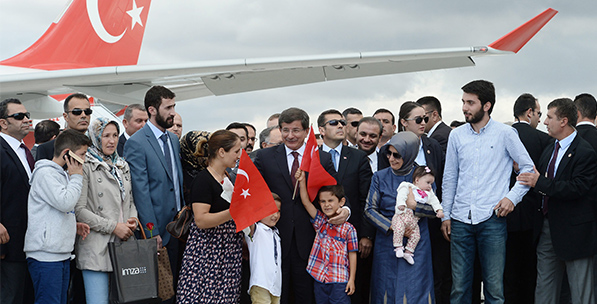Searching for a New Social Contract in Turkey, Tunisia and Morocco
Tunisia and Morocco have improved their standards of democracy and positively responded to the demands of their people throughout the Arab Spring.
More


Turkish, Moroccan Experts Discuss Regional Issues
Political scientists from Turkey and Morocco gathered to analyze the issues that both the region and the two countries face.
More
The Western media sees Kobani as a symbol that will trigger an armed fight for democracy, as it did in the Arab Spring, which puts it to the fore.
The reconciliation process has been one of the vital components of Turkey's economic ascendancy in the last decade through its major support mechanism for politico-economic stability and improved relations with neighboring countries in the Middle East.
Is this draft guaranteeing Muslims the same rights as other legally recognized churches and public religious bodies?
The anti-ISIS campaign has evolved into a chess game, played not only by Washington and Turkish officials, but also other regional actors involving a number of subsequent and contradictory moves.
Kobani and Turkish-American Relations
After the U.S. decision not to attack the Syrian regime, questions and skepticism started to emerge about the U.S. strategy in Syria.
More


The Northern Front of the Combat against ISIS: Peshmarga-Western Alliance
What is the ISIS strategy in the north of Iraq? In which regions do the Peshmerga-ISIS clashes intensify? Who are the partners of the prospective coalition against ISIS and what do they aim for?
More
U.S. officials are eager to point their fingers at Turkey and blame Ankara for its inaction in the crisis in Kobani.
The recent clashes around Kobani are once more demonstrating that the military airstrikes by the international coalition will not be sufficient to eradicate the ISIS from the region without a comprehensive strategy to resolve the crisis in Syria and Iraq at the same time.
The Kurdish political movements in both Syria and Turkey should give up being pragmatists in order to have pragmatic gains. The Kurdish political movements should also give up being opportunists in order to benefit from the opportunities in the region.
In a post-ISIS region, it is likely new radical groups claiming to wage jihad bent on shattering the Middle East's religious environment will emerge. Such radicalization in Turkey's neighborhood has become a growing threat.
Forty-nine hostages were rescued from ISIS after a successful operation. Considering the delicacy of the situation, the supervision and conduct of this operation appear worthy of commendation.
Erdoğan was right when he protested Western media reports associating Turkey with ISIS and the politically motivated decisions of credit rating agencies that contradicted their approach toward similar economies.
Ending sectarian politics and establishing a new inclusive government in Baghdad is essential to diminishing the continuing support for the Islamic State of Iraq and al-Sham (ISIS), foreign policy expert Mehmet Özkan stresses.
First and foremost, the Abadi government will have to accumulate enough power to discourage Sunni tribes from joining ISIS fighters. The main question remains: what will happen once ISIS is defeated?
First of all, it is not clear how ISIS will be destroyed and what the projected timeframe for this operation will be.













